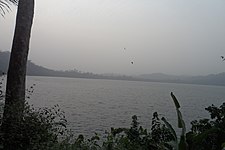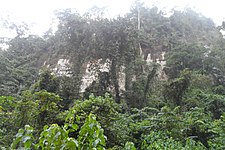Kumba
This article needs additional citations for verification. (October 2021) |
Kumba | |
|---|---|
 Kumba | |
| Motto: "The Green City" | |
| Coordinates: 4°38′N 9°27′E / 4.633°N 9.450°E | |
| Country | |
| Province | Southwest Region |
| Division | Meme (department) |
| District | Central Kumba |
| Elevation | 240 m (790 ft) |
| Population (2019) | |
| • Total | 144,413 [1] |



Kumba is a city in the Southwest Region of Cameroon and the administrative capital of Meme Division. It is one of the largest and most economically significant cities in the Anglophone regions of Cameroon. Known for its vibrant commercial activity, Kumba plays a crucial role as a trade and transportation hub for the Southwest Region, particularly in the agricultural sector.
Etymology
[edit]The name 'Kumba' originates from the Bafaw word 'Bakumbè', meaning an umbrella tree
History
[edit]Kumba has a rich historical and cultural background, originally inhabited by the Bafaw and Bakundu peoples. Over time, it developed into a significant commercial center due to its strategic location connecting various parts of Cameroon. Its colonial history, particularly under German and later British rule, has shaped its present identity as part of the English-speaking regions of Cameroon.
Kumba has long been an important center for trade and agriculture. Its growth as a commercial town began during the colonial period when Cameroon was under German, and later, British and French rule. The establishment of road networks connecting Kumba to other parts of the Southwest Region, such as Mamfe and Buea, helped solidify its role as a regional hub.
In recent years, Kumba has been impacted by the ongoing Anglophone Crisis, which began in 2016. The conflict between separatist forces seeking independence for the Anglophone regions and the central government has led to significant disruptions in education, business, and local governance.
According to local mythology, Kumba was founded by the hunter Midiki Bokeng, In his honour a monument has been put up around the Town Green. Kumba was originally a Bafo tribal capital formed after the Mediki wars. Mediki was a Bafo native sent by the Bafo chief Nguti to fight other tribes around the settlement which he did successfully. Mediki fought together with Eseme Modu and capturde territories as far as Ekombe. The settlement of Kumba wasthe capital ofthe former Rio Del Rey Division in German Cameroon and continued to exist into the British period. Abel Mukete, a local Bafo chief, became the head of native authority in the district, beginning in the 1890s and even became the first Paramount Chief in 1929. The title was passed down to his eldest son, John Muket,e and next to Nfon Victor E Mukete (the CEO of Camtel). The chief of Kumba is the paramount chief of the Bafo.
On the 24th October 2020, a mass shooting took place at a school, 7 died and 13 were injured.
Economy
[edit]Kumba is a trade centre for cocoa, palm oil and rubber, and has a timber industry as well. Kumba is a local road junction, making it the main commercial town in Anglophone Cameroon. It has two main markets, Kumba Market and Fiango Market, and several smaller markets created by farmers who bring food directly from their farms, such as the Mbonge Road market, Three Corners market, and the Back Market. Due to the high level of activity in the city, it has attracted Nigerian traders, particularly the Igbo and Yoruba who own more than 60% of the shops in the town, according to a 2011 survey. Trade is controlled by the Kumba City Council, trade revenue accounts for most of the city's budget. Most of the people in Kumba are farmers and therefore Kumba has become a major trade centre with traders and businesspeople flocking from across Cameroon, and even as far as Nigeria, Equatorial Guinea, Gabon and Chad for Kumba's trade.
Geography
[edit]Kumba is the largest town in the Meme Department and Southwest Region of Cameroon. It is situated on flat lands around the Buea Road area with hills around Fiango and Mbonge Road. There are three main water bodies: Lake Barombi Mbo, which is the largest volcanic lake in Cameroon and a tourist attraction, Kumba Water that passes through Buea Road at the Kumba Mbeng bridge, And the Mbanga Water, running through the city, the local nickname of the Mbanga is the Mabonjise. Most major roads to the nearby villages start at Kumba, running to the Nigerian border at Mamfe, the Korup National Park at Mundemba, and Mount Koupe to the east.
-
Crater Lake, Kumba
-
Forest Reserve, Lake Barombi
-
Bakundu Forest Reserve, Lake Barombi
-
Lake Barombi
-
Pyroclastic deposit, Kumba
Administration
[edit]Kumba is the capital of the Meme department of the Southwest Region. It has three sub-divisional councils: Kumba 1 (Kumba Town-Kake, a part of Buea Road), Kumba 2 (Kosala, Hausa-quarters and Fiango) and Kumba 3 (Three Corners, Mambanda and a part of Buea Road), each has a local mayor. The town is also run by a government appointed Senior Divisional Officer (SDO) and a government delegate.
Transport
[edit]Kumba is the terminus of a branch railway of the western system of Camrail. Kumba has three major motor parks: one situated at Buea road in Barombi Kang, the second at Fiango (Three Corners), and the third on Mbonge road (Mile One).
-
Transport in Kumba in the rainy season
People and Culture
[edit]Languages
The majority of the Kumba people speak English, Pidgin and to a lesser extent, French, and a sizeable amount of indigenous languages, most presently the Bafaw, Bakundu, Bakossi and Mbonge.
The ethnic groups of Kumba are the Bafaw and the Bakundus. Bafaw is an ethnic group who speak Lifaw, a language similar to Duala, and the Bakundu ethnic group who speak the Bakundu language (Orocko language), Mboh, Bakundu Language and Bakossi, and certainly Southern Bantoid. Due to the city's cosmopolitan nature, the Bafaw and the Bakundu now form just a percentage of the general population of the city, and have lost many aspects of their culture, except for their language which is spoken mostly by the elderly and some of the younger generation.
See also
[edit]References
[edit]- ^ "Population of Cities in Cameroon (2021)". Archived from the original on 2021-05-23.










